ASX dives 2.2% in blue chip sell-off
Just one of the top 50 stocks managed to turn a gain as the ASX fell to its lowest close since June and meat processor JBS unveiled 600 job cuts.

- No economic recovery without retail: Zahra
- Top stockpicking fund warns of correction
- More downside ahead for US shares: MS
- Home loans smash estimates
That’s all from the Trading Day blog for Wednesday, September 9. Australian stocks closed down by 2.2pc to their lowest level since June with tech jitters in the US extending across the equity market more broadly.
The big four banks and CSL led the market lower – wiping more than 35 points off the index – while on the economic front home lending smashed expectations and Westpac consumer sentiment “roared back” with an 18pc jump. US futures suggest further pain to come overnight.
Nick Evans 9.37pm: Pressure mounting on Rio Tinto board
The Church of England’s pension fund has added to growing pressure on Rio Tinto to take stronger action over the destruction of 46,000-year-old heritage sites in the Pilbara, saying it was a test for the global miner’s board.
The comments come as Rio chief executive Jean-Sebastien Jacques tours the Pilbara talking to traditional owner groups over the Juukan Gorge disaster, and ahead of a board meeting this week that is expected to discuss additional sanctions against Mr Jacques, iron ore boss Chris Salisbury and corporate relations chief Simone Niven.
While the timing of the meeting and the possible outcomes are not yet clear, sources close to Rio say that “all options are on the table” as pressure mounts on the board to consider whether the trio have a future at the mining giant.
The CoE pension fund added to the pressure on Wednesday, confirming institutional investors had been pushing Rio to strengthen its response to the Juukan debacle.
Amid criticism that stripping bonuses worth about $7m was an inadequate response to the destruction of the heritage sites, Adam Matthews, head of engagement for the Church of England Pensions Board, told UK radio the issue was now a “test for the board”.
“The (internal) review has clearly shown that there’s been a series of failings at the company. It’s made a recommendation of actions they need to take, it’s also penalised them with reductions of bonuses,” he said.
Jared Lynch 8.11pm: Chinese ‘daigou’ trade dries up
Victoria’s stage-four restrictions has almost cruelled the lucrative daigou trade between Australia and China as tensions between the two countries continue to escalate.
The daigou, or trusted shoppers who are either students or tourists, would buy up Australian goods on behalf of Chinese consumers and export them to China.
It is a market that has split into two sectors — basic retail and the more sophisticated “corporate buyers” — and which has delivered riches in past years to companies such as A2 Milk and Blackmores.
But uncertainty surrounds the near-term outlook of the daigou market. In June, China warned students to rethink travel to Australia over alleged racism, while the Department of Foreign Affairs and Trade also warned Australians not to travel to China as Beijing had detained foreigners for allegedly “endangering national security”.
Further putting a handbrake on the daigou trade is the forced closure of stores across Melbourne that stock infant formula and healthcare products, which are popular among Chinese parents.
Patrick Commins 7.10pm: JobKeeper creates ‘uneven playing field’
The country’s biggest meat processing company is blaming competitive distortions created by the government’s JobKeeper program for its decision to sack 600 workers at its largest abattoir in Queensland.
JBS Australia said it would scale back operations at its Dinmore abattoir southwest of Brisbane, a decision chief executive Brent Eastwood said would allow the company to preserve the remaining 1150 full-time roles at Dinmore, as well as protect workers as its Townsville and Rockhampton facilities.
Mr Eastwood said “this is not a decision we have arrived at lightly”.
“We treat our workers like family, and this was a very, very difficult decision,” he said.
“Already facing a severe livestock supply shortage following an extended period of drought, the COVID-19 crisis has significantly impacted the Dinmore business,” Mr Eastwood said. “The situation has been further exacerbated by the market inequity created by the federal government’s JobKeeper program.”
JBS Australia was not eligible for the wage subsidy scheme, as the Australian arm of the Brazilian-owned meat processing giant did not meet the required 50 per cent fall in operating income.
Ben Wilmot 6.43pm: EG sets up private wealth division
Real-estate fund manager EG is looking to capitalise on the disjointed property market and has set up a private wealth division to back fresh opportunities.
It will provide commercial property syndication funds for sophisticated investors and family offices and target high income returns supported by long term leases up at least 15 years.
They will receive an average distribution of 8.5 per cent per annum based on a seven-year hold strategy. EG is targeting a minimum $150m in gross asset value over the next 12 months.
EG is a data driven investment manager and developer with more than $3.2bn in assets under management and holds assets in most capital cities. It has a proven track record with two-decades of experience in institutional mandates.
Ben Wilmot 6.12pm: Cromwell Property Group board appointment
The under-pressure Cromwell Property Group has appointed a new independent non-executive director to its board, tapping John Humphrey.
Cromwell board’s nomination and remuneration committee and external adviser, Hattonneale, evaluated and considered a number of potential board candidates, as part of a board renewal process.
Mr Humphrey has more than 40 years of corporate law experience, specialising in mergers and acquisitions, major commercial transactions and capital raisings, and is a former member of the Takeovers Panel.
He also sits on the board of listed companies, including Lynas Corporation and Auswide Bank, and is chair of Spotless Group Holdings Limited. Mr Humphrey is a former director of the listed Downer Group, a former chair Horizon Oil and of Villa World and Bligh Ventures.
The board is under siege from major shareholder ARA Asset Management which has sought to appoint two high profile directors - Dr Gary Weiss and Melbourne businessman and ABC board member Joe Gersh - to the board of the Paul Weightman-led company.
The bid by corporate raider De Weiss to be appointed to the board was this week rejected by institutional proxy adviser ISS, setting the scene for a tight vote at a meeting later this month.
But it is supporting Mr Gersh, who is effectively on the same ticket, to be appointed to Cromwell’s board.
Last week proxy house CGI Glass Lewis lashed the push to elect them to the board.
Bridget Carter 5.15pm: Whispir shareholders offloading
DataRoom | Whispir shareholders are offloading 20.3 million shares in a $77.4m block trade.
Working on the selldown out of the cloud-based communications platform is Canaccord Genuity, Ord Minnett and Wilsons.
Shares are being sold at $3.81 each, a 10.4 per cent discount to the last closing price of $4.25.
Those selling out include shareholders who invested in Whispir before its initial public offering, including OSV Hush Holdings, Gobleg Pty, Blackburn Family Trust, Telstra Ventures, PT Metra Digital Investama and other employees and investors.
Whispir’s chief executive Jeromy Wells, who is the largest investor, is not participating in the block trade.
4.38pm: Local tech shares bounce from lows
The local market was overwhelmingly negative on Wednesday, with 93 per cent of the top 200 stocks falling over the session, but while tech shares led the offshore drop, local growth names known as WAAAX were able to bounce off daily lows.
By the close, WiseTech was down a more moderate 1.9pc, while Afterpay fought back from losses as much as 7pc to close down just 1.3pc at $74.05.
Appen closed lower by 4.1pc, while Altium lost 1.9pc and Xero fell by 2.1pc.
Even the much-hyped buy now, pay later stocks were able to recover intraday - Zip trimming losses to 2.1pc while Splitit managed to gain 0.34pc. Recent entrant Laybuy took a bigger hit, falling by 6.6pc.
Here’s the biggest movers at the close:
4.14pm: Shares dive 2.2pc as heavyweights drag
Shares pared some of their intraday falls but finished the day down 2.2pc in a broad market sell-off.
Shares touched lows of 5849.4 but finished the session down a more moderate 129 points or 2.15 per cent at 5878.6 - the worst close since June 29.
Heavyweight banks and CSL accounted for much of the drag – CSL fell by 2.5 per cent on jitters around the AstraZeneca COVID-19 vaccine trials, while the big four banks fell between 2.5pc and 3.3pc.
Lendlease was the only in the top 50 to eke a gain, adding 0.63pc after finalising the sale of its engineering unit.
3.54pm: Meat exporter JBS to slash 600 jobs: reports
Australia’s largest meat processor and exporter JBS is slashing 600 jobs, according to Bloomberg.
The group, which employs roughly 12,000 employees and exports to more than 50 countries, last month said it was facing an extended shutdown because of its inability to access JobKeeper.
Today, it said it would cut 600 full-time jobs from its Dinmore operations in Queensland, citing “a range of issues impacting livestock supply and market conditions in the COVID-19 environment”, according to a statement cited by Bloomberg.
JBS will retain 1150 full-time jobs at Dinmore and said it sought to offer impacted workers other positions in the company where possible.
The group also faced disruption in July after two of its Melbourne abattoir workers tested positive for coronavirus, prompting a move to voluntarily stop exports from its Brooklyn plant to China.
Read more: JBS halts beef exports to China
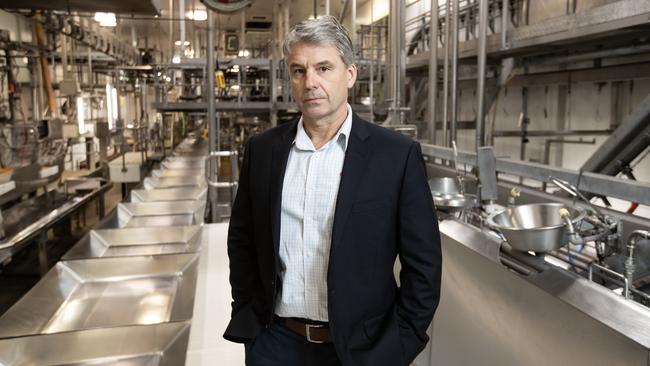
3.51pm: US stocks will take longer to recover: JPM
It may take longer for the S&P 500 to recover from its current sell-off than it did after the June sell-off, albeit recent jitters are unlikely to see a repeat of the tech sector collapse of 2000, according to JP Morgan.
The recent sell-off reflects an accumulation of investor worries centred on the performance of technology and growth stocks, as well as falling oil prices and negative Brexit headlines, says global market strategist, Kerry Craig.
While noting that the broad pillars of support for the equity market remain intact, he cautions that a market fuelled by central bank largesse, economic surprises and record earnings beats in the last few months was never going to maintain its heady pace forever.
The September sell-off may have eased some concerns surrounding overcrowded positioning in some sectors, but a recovery may take longer to eventuate given the pace of the rally this year, lingering concerns around market concentration and the US Presidential election.
“It’s possible that economic momentum in the US starts to wane in the coming months as the initial bounce out of recession fades and fiscal stimulus efforts remain constrained by partisan politics,” Mr Craig says.
“This may limit the ability of economic data to surprise to the upside and boost equity markets.”
He also warns that “the starting point for a leg up in equities is less favourable now than in June, as aggregate equity short positions have been greatly reduced”.
In his view markets may move sideways rather than up in the coming months given the near term event risk, elevated valuations and concentration of returns in the US equity market.
Perry Williams 3.32pm: UAC sells stake in Infigen
A one-time bidder for Infigen Energy has thrown in the towel after selling its 20 per cent stake in the ASX-listed renewables developer to Spanish suitor Iberdrola Group.
The Philippines controlled UAC Energy, which kicked off the takeover tussle for Infigen back in June, said it had sold its stake for 92c a share after buying in at an average price of 79.4c per share.
UAC had originally lobbed a 80c a share offer for the clean energy operator valuing its bid at $777m before being outmuscled by Spanish giant Iberdrola which bid 86c a share and was later upped to 89c a share and finally to 92c a share on July 24.
Once the UAC sale completes, Iberdrola will control over 97 per cent of Infigen shares.
“With the potential delisting of Infigen, AC Energy (UAC parent) has decided to divest its stake in the company. We wish Iberdrola well on its successful acquisition of the platform,” AC Energy International chief operating officer Patrice Clausse said.
“Meanwhile AC Energy remain committed to invest in Australia as it moves to ramping up construction of its 720MW New England Solar Farm in the coming months.”
IFN last traded at 92c.
Read more: Infigen expects profits to drop as demand falls
Lachlan Moffet Gray 3.08pm: Vietnamese billionaire buys Holden test track
Vietnamese car manufacturer VinFast has signed an agreement with GM Holden to purchase the Holden Proving Ground facility at Lang Lang in Victoria for an undisclosed amount.
The proving ground, which was established in 1958, had been up for sale since GM Holden announced they would wind down the iconic Holden brand in Australia.
The site contains an emissions laboratory and almost 10km of track for the testing of vehicles.
VinFast, which was established in 2017 by Vietnam’s first billionaire Pham Nhat Vuong, has established itself in Australia by opening a research and development facility in Melbourne in June.
The company hired several ex-Holden employees and says it plans to eventually sell cars on the Australian market, but is currently concentrating on expanding its presence in Vietnam, where it is the fifth-largest car brand, and expanding into the US with an electric vehicle currently under development.
“This deal hits a sweet spot of a fair sale value, a ready-made facility for VinFast’s needs, ongoing employment for departing Holden employees and the preservation of amenity for the community,” GM Holden boss Kristian Aquilina said.
Read more: Last goodbye for 160-year-old Holden brand
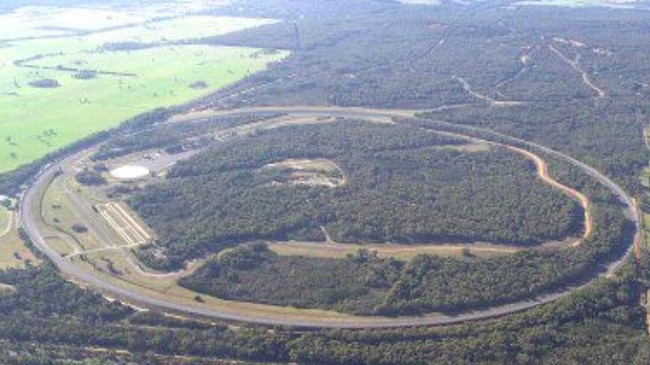
2.41pm: Chalice’s ‘most significant greenfield discovery’
Chalice Gold Mines shares are up 7.4pc at $1.45 after hitting $1.475, defying the market downturn after Macquarie Equities initiated coverage with a Buy rating and $1.80 price target.
The broker said the $445m miner’s Julimar project is one of the most significant greenfield discoveries in Australia in years.
“Our analysis of the drilling success to date at Julimar suggests Chalice has already confirmed the existence of an economic deposit that could deliver production rates of 270,000 oz per annum of Platinum Group Elements and 20,000 tons per annum of base metals,” the broker said.
2.15pm: ASX weakest in Asia Pac
Australia’s sharemarket is by far the weakest in the APAC region today.
The S&P/ASX 200 is down 2.3pc at 5867 after falling as much as 2.6pc to a 2.5-month low of 5849.4.
While it outperformed with a 1.1pc rise on Monday, the S&P/ASX 200 was also weakest in the region on Friday when it dived 3.1pc.
The S&P/ASX 200 underperformed most global markets with a 41pc bounce off its March low as the Australian dollar surged 35pc.
1.46pm: Value more important than ever: Antipodes
Antipodes CIO Jacob Mitchell argues that value is “more important than ever” for investors seeking capital preservation and long term growth.
While the recent volatility remains a “blip during an extended period of market extremes surpassing the dotcom bubble”, it’s a reminder of the risks of ignoring value and “blindly chasing momentum”.
“At these levels of market extremes, growth traps are rife and investors should be reminded that when the dotcom bubble burst even great business de-rated for an extended period of time because they were trading at excessive initial multiples,” he says.
Trying to pinpoint a market turning point is “typically fraught”, but “we’re in for a very interesting period” after Wall Street surged to record highs on unprecedented stimulus during the pandemic.
“Extraordinary multiple dispersion leaves us confident that the long-term future market leaders are most likely to be today’s misunderstood, lower-multiple stocks,” Mr Mitchell says.
“Some pundits may tell you value is dead, it isn’t. In today’s market a value-style exposure in investment portfolios is arguably more important than ever for investors seeking capital preservation and long term growth.”
Eli Greenblat 1.32pm: No economic recovery without retail: Zahra
Australian Retailers Association chief executive Paul Zahra said there were “no signs” that the Victorian government will review its tough and slow reopening of the state’s economy, adding that the business community was called in for consultative sessions that were more like “information sessions”.
Speaking at the National Press Club in Canberra, Mr Zahra said there couldn’t be an economic recovery without a retail recovery and that the Victorian government adopted a “broad brush approach” to the entire retail sector, regardless of store size.
“There is no sign yet, we were called into what was classed a consultation session but were more like information sessions, unfortunately there was very little feedback that was taken on board at this point,” Mr Zahra said.
“I have a great relationship with the Victorian government, we want to continue that relationship, however we believe that we were asking for a progressive reopening in retail and what we got was a delayed reopening. As a result most of our members are small business, and we believe around 50 per cent of those small businesses in Victoria will permanently closed.’’
He said the consultation with the business community should have gone beyond just a health factor, but a much broader conversation – which it wasn’t.
Read more: Andrews has ‘scorched earth’ plan for retail
1.01pm: 96pc of stocks falling
Shares are falling to new lows at lunch, as the markets biggest names take heavy hits.
At 1pm, the benchmark ASX200 is off by 156 points or 2.6% to 5851.6.
Heavyweights CSL, Commonwealth Bank and BHP are doing the most damage, wiping a collective 35 points off the index, while all of the top 50 stocks reverse.
On the broader ASX200, 96% of stocks are falling, with a select few such as Inghams, IPH and GUD Holdings clinging on to marginal gains.
Afterpay has bounced from intraday lows of $70.06 to trade down by 1.2% at $74.14 while WiseTech is off by 3.4% to $27.64 and Appen lower by 4.3% to $31.46.
Here are the biggest movers at 1pm:
Lachlan Moffet Gray 12.50pm: Victoria’s ‘slow reopening’ to cost $5bn more: UBS
Victoria’s conservative lifting of its stage four lockdown will cost the economy an additional $5bn and result in a need for further government stimulus, according to UBS.
In an analyst note, UBS chief economist George Tharenou said the “slow reopening” of Victoria had prompted the investment bank to upgrade the total economic cost of the state’s lockdown in the third quarter to $20bn from earlier estimates of $15bn.
The extra $5bn hit to the economy represents 0.25 per cent of annual GDP, which “suggests Q3 GDP could be negative,” Mr Tharenou wrote, although UBS still projected a small amount of growth in the quarter due to relatively strong payroll growth.
Mr Tharenou also said that UBS’s forecast of 1 per cent growth in the fourth quarter “could be lower if lockdown persists,” and said it expected a further $50bn in fiscal stimulus from governments as well as an even chance of quantitative easing from the RBA.
“While total Government fiscal stimulus is already >13% of annual GDP, we expect further support will be required,” Mr Tharenou said.
“Insolvency protections have been extended until Dec-20, and further extension of debt deferrals (beyond Jan-21), and associated regulatory relief may be necessary. We expect $50bn+ more fiscal stimulus.
“The RBA said they will be ‘highly accommodative’, and we see a 50-50 chance of ‘proper QE’.”
12.41pm: ASX tests chart support
Australia’s share market extended its intraday fall as the Energy, Tech and Financial sectors continued to lead broadbased falls.
The S&P/ASX 200 index fell 2.6 per cent to a 2.5-month low of 5852.3, below chart support from the August low at 5860.7.
The index teetering at its 100-day moving average at 5853 after staying above this line since June, when it had a two-day dip below the line. A break could test the bottom of the 5720-6200 trading range which has held for the past three months.
A more serious pullback could test the 38.2pc Fibonacci retracement of the March-June rise, at 5512, marking a 10pc correction from the high.
Nasdaq futures are up 0.7pc and S&P 500 futures are flat after falling as much as 1.1pc this morning on bad news for the AstraZeneca-Oxford coronavirus vaccine trial.
But AstraZeneca shares remain down more than 8pc in after-hours trading. Disappointment with its trial hiccup could easily spark a further sell-off in risk assets.
Bridget Carter 12.38pm: Lendlease finalises engineering sale
DataRoom | Construction and real estate group Lendlease has finalised a deal to sell its engineering arm to Spanish conglomerate Acciona for $160 million.
The transaction was announced by the $8.7 billion Australian-listed company on Wednesday.
Acciona Australia will effectively be paying $152m for the business, stripping out costs linked to transaction delays.
The group had earlier reported the book value of its plant and equipment at about $150m last year so the transaction is valuing the rest of the business at about $2m.
Acciona Australia’s management, including Bede and Andre Noonan, will own 20 per cent of the business, with the Spanish group holding the remainder.
The Noonan’s gained the stake in the Acciona Australia business after the Spanish group purchased their family-run Geotech Group three years ago.
Read more: Lendlease profit tumbles on pandemic, engineering exit
11.51am: Banks doing most damage as ASX dives
Tech shares are diving, but it's the major banks that are doing the bulk of the damage – wiping 30 points off the benchmark ASX200.
Commonwealth Bank is lower by 2.5% to $66.75, as Westpac trades down by 3.4% to $17.06, ANZ slips by 3.4% to $17.73 and NAB falls by 2.8% to $17.39.
CSL is the only larger weight on the index, falling 2.5pc to $280.84 after AstraZeneca paused its trial amid safety concerns.
ASX last down 2.5pc to 5862.6.
Read more: Vaccine trial ‘not off table’ despite pause
Lachlan Moffet Gray 11.46am: Zebit gearing up for IPO roadshow
DataRoom | US buy now pay later service provider and retailer Zebit is gearing up for a formal roadshow in the next few weeks, with a view of raising around $40m through an IPO to accelerate their growth in North America.
DataRoom understands that the offering is being led by Shaw and Partners, with the company to be worth about $200m once it lists on the Australian Securities Exchange.
Zebit targets the United States market and focuses on “credit challenged” Americans who live pay cheque to pay cheque and find it difficult to qualify for formal credit cards or other BNPL platforms.
It also trades a retailer, offering appliances and electronic goods online. The company offers interest free credit for purchases off of its retail websites.
Zebit recorded revenue of $US85.5m in 2019. The IPO will accompany $US50m of venture capital already raised and $US5m raised through a pre-IPO convertible note.
11.37am: Home loans smash estimates
July home loans have smashed estimates with an 8.9% month-on-month rise in value versus 2% expected. Owner occupier loan value surged 10.7% vs 1.8% expected.
Investor loans rose just 3.5% from 8.1% in June.
11.35am: Mincor cheers nickel discovery
Mincor shares are performing strongly after a new high-grade nickel discovery at Cassini North.
Shares surged 6% to a 6-year high of $0.91 while the broader market fell as much as 2.3%.
The high-grade intercept of 2.5m at 6.6% nickel is the latest good news for the nickel miner after Andrew Twiggy Forrest boosted his stake to 15 per cent last month.
Lachlan Moffet Gray 11.06am: MS lays out options for Scentre
DataRoom | Shopping centre landlord Scentre Group has many options to reduce its high level debt levels, say analysts at Morgan Stanley, as speculation continues to mount over the prospect of an equity raising.
As The Australian reported last week, industry insiders say that an institutional placement to the order of $1.8bn could be on the cards as the company battles with a relatively high gearing level of 38.4 per cent.
However, the company’s silence on the matter raises the prospect that management could be canvassing other ways to pay down debt.
In a note, Morgan Stanley analysts said Scentre could analyse options such as divesting assets, suspending dividends for two years or simply doing nothing.
Noting that four of the 13 properties Scentre owns wholly are among some of the most productive shopping centres in the nation, the analysts suggested the company could package up a 25 per cent stake in the malls – which includes those like Westfield in Sydney and Bondi – and take the offering to market.
“Divestment at book value ($2.9bn) would lower gearing to 33 per cent … while a 20 per cent discount would lower gearing to 36 per cent,” the analysts wrote.
SCG shares last down 2.6% to $2.21.
Read more: Scentre eyes $18bn raising
Eli Greenblat 10.59am: Brookes to revive Colette
Former Myer chief executive Bernie Brookes has re-entered the fashion world after stepping down as boss of the department store owner five years ago, forming a partnership with one of his former colleagues from Woolworths to buy the failed Colette by Colette Hayman out from voluntary administration.
Colette by Colette Hayman collapsed in January as a result of poor trading conditions, a tough economy and a downturn in consumer spending in the discretionary sector, Mr Brookes’ rescue of the personal accessory chain will save around 300 jobs.
Deloitte Restructuring Services partners Vaughan Strawbridge, Sam Marsden and Jason Tracy were appointed voluntary administrators over fashion accessories retailer CBCH group of companies, trading as Colette by Colette Hayman, on January 31.
The administrators on Tuesday confirmed the successful recapitalisation and sale of the group, as flagged by The Australian’s DataRoom in July.
Mr Marsden said “the sale of the business to a group of experienced retail investors represents a significant achievement in the current environment, and reflects the strength of the brand and the commitment of the group’s employees to its future”.
Read more: Bernie Brookes in hot pursuit of Colette
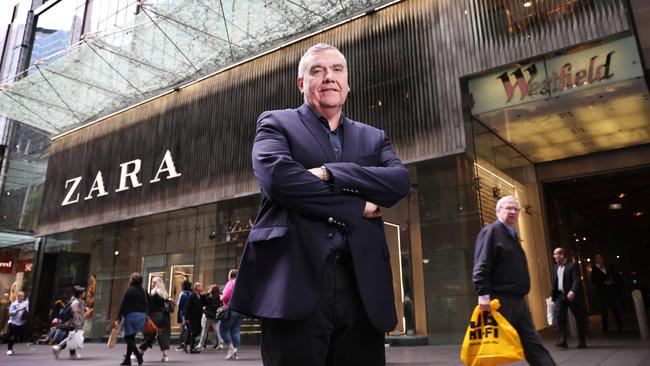
10.48am: Sentiment rebounds by 18%: Westpac
Westpac’s consumer sentiment survey shows a “pleasant surprise” with an 18% surge for September, now just 1.6% below pre-pandemic levels.
The latest Westpac-Melbourne Institute Index survey bounced back strongly from 79.5 in August, to 93.8 in September.
Chief economist at the bank, Bill Evans, noted that respondents were more focused on the future, with August’s read a likely “over-reaction”.
The survey predates the new road map from the Andrews government, however, with the extension of lockdowns likely to have detracted somewhat from the optimism.
“The disappointment with that announcement could have been expected to dampen the 14.9% surge in confidence in Victoria, although frustration at the extended lockdown measures would likely still be more than outweighed by the clear success they have had in containing the virus,” he said.
The rebound means the index is now just 1.6% below the average over the six months prior to the emergence of COVID-19 in March.
Eli Greenblat 10.39am: Retailers join tech slide
The nation’s leading retailers were hit hard by the slide on Wall Street overnight as some of the gains the sector has enjoyed over the last few months were handed back.
In the first half-hour of trade, Wesfarmers was down 1.88 per cent to $45.33, Woolworths down 1.7 per cent to $36.75 and Coles weaker by 1.75 per cent to $16.83.
Department store Myer took a 4 per cent hit to 24.5 cents while online rival Kogan.com fell 2.6 per cent $19.48 and Temple & Webster was down 1.87 per cent to $9.43.
Harvey Norman has fallen 1.4 per cent to $4.23, Premier Investments down 1.6 per cent to $18.55 and Domino’s Pizza weaker by 1 per cent to $80.50.
10.20am: More downside ahead for US shares: MS
The US share market likely has more downside over the next few weeks due to options related positioning in the tech sector before an eventual “broadening out of the bull market”, according to Morgan Stanley’s head of US equity strategy, Mike Wilson.
“In a nutshell, the call buying left many broker dealers short gamma in the leading large cap tech stocks which means they became nearly indiscriminate buyers of these stocks as they rose and then sellers when the rally finally exhausted and turned down,” he says.
“The bottom line is that this correction was long overdue and likely has more downside over the next few weeks/month as these positions are cleared out.”
But he notes that US both economic data and earnings revisions data have been “remarkable” and “are the main reason why stocks have rallied so much since March”.
“More specifically, our equity risk premium metric has been quite stable over the past few months and was actually above its lowest levels in early June when the market peaked last Wednesday.
“As we have argued since April, the ERP is simply following the typical recession/recovery pattern and could fall modestly further should this pattern hold from 2009. However, it’s unlikely to make new lows in the near term if the high flying tech stocks remain under pressure until these call / short gamma positions are cleaned up.”
The Nasdaq entered a technical correction last night with a 10% fall from its record high that has marked the worst first 5-days of September for the index on record.
Stairs up, elevator down.
— IGSquawk (@IGSquawk) September 9, 2020
Most of August's gains wiped out. pic.twitter.com/1r3Mv7clnc
10.11am: Tech hammered as ASX drops 2.3%
Tech shares are leading the market sharply lower, taking lead from the Nasdaq overnight.
At the open, the benchmark ASX200 is down by 134 points or 2.3 per cent to a five-week low of 5867.9.
The index now faces a test of key chart support from last week’s low at 5870, the August low at 5860.7 and the 100-day moving average at 5853.
Tech stocks that have drive much of the recent rally are leading the sell-off today- Afterpay is off by 5.3%, Zip down by 3.3%, Xero lower by 2.9% and WiseTech off by 5.2%.
Oil weakness is adding to the drag, with energy shares off by 3.3% as Woodside falls 3.5% to a five-month low while concern of the efficacy of COVID-19 drug trials is weighing on CSL, pulling it down by 2.4%.
9.48am: PointsBet returns after raising $153m
Online wagering group PointsBet will return to trade this morning after completing its $153.2m institutional entitlement offer.
After inking a “game changing” deal with NBCUniversal, PointsBet launched a capital raise with a placement completed on Friday and entitlement offer completed today.
The group said 55% of eligible entitlements were taken up by existing shareholders, with the remainder offered through a shortfall bookbuild at a final clearing price of $12.5 – a $6 premium to the entitlement offer price.
A further retail entitlement offer will open on Friday and is expected to raise $82.7m.
PBH shares last traded at $13.69.
Read more: PointsBet raise proves investors keen for punt
9.28am: QBE chief gets $310,000 on exit
Outgoing QBE chief Pat Regan will receive a $310,000 payment in lieu of a reduced notice period, after exiting on September 1 over inappropriate behaviour.
QBE said this morning that Mr Regan had finished up with the insurer on Tuesday, and would receive the $310,000 payment along with his leave entitlements, but would not receive any grants under the firm’s incentive schemes for the 2020 financial year.
In accordance with the incentive plan, his unvested conditional rights will lapse immediately.
Read more: Praise for fast QBE action as CEO Pat Regan exits
9.25am: What’s on the broker radar?
- Ansell raised to Buy – Citi
- Crown price target cut 13% to $10.50 – Morgan Stanley
- CSL raised to Buy – Citi
- OceanaGold rated new Hold – Desjardins
- Webcentral cut to Speculative Sell – Bell Potter
9.19am: US tech dive to weigh on ASX
Australia’s share market should react negatively to unexpected falls in US equities and crude oil prices, as well as bad news for the AstraZeneca-Oxford coronavirus vaccine trial.
Overnight futures relative to fair value suggest the S&P/ASX 200 will open down 1.9% at 5893 after rising 1.1% to 6007.84 on Tuesday.
That followed sharp falls on Wall Street, with the S&P 500 down 2.8% to a 4-week low at the close of 3331.84. The Nasdaq fell 4.1%, with NYFANG down 7%, Apple down 6.7% for its largest three day slide since October 2008 and Microsoft down 5.4%. Telsa fell 21% after failing to get S&P 500 index inclusion last week.
Since the start of month, the Nasdaq is down 7.88%, its worst first 5 days of a month since August 2011 and its worst start to a September on record.
Adding to downward pressure on Australian shares, S&P 500 futures are down 0.5% in early trading.
Westpac’s Australian consumer confidence index is due for release at 10.30am.
9.11am: Hearts and Minds warns of volatility
The listed Hearts and Minds investment has warned of volatility in the market, saying the correction in market last week was “not surprising”.
In an investment update released this morning, the fund, made up of stock picks from leading fund managers at the Sohn conference, outlined its 7.2% monthly return for August, but said its high exposure to the technology sector could be a catalyst for near-term volatility.
“Given the strength of markets around the world since COVID-19 hit in February/March, where many indices are now back towards all-time highs, we think it prudent to urge caution on this environment,” the fund said.
“Some of the share price moves we have seen recently are difficult to comprehend, and some may have more optimism priced in than is perhaps realistic. In the long term, share prices move on fundamentals, while in the short term, momentum and euphoria will often take precedence.
“As we have always said, portfolio risk management is paramount to long term success, and never more so than in the world we currently find ourselves in.”
It said just two stocks in its portfolio had reversed over August, including A2 Milk.
David Ross 7.55am: AstraZeneca vaccine study paused: report
AstraZeneca has put on hold a COVID-19 vaccine study due to a suspected serious adverse reaction in a participant in the UK, according to a report from Stat News.
A company representative told Stat that the company’s “standard review process triggered a pause to vaccination to allow review of safety data”.
It wasn’t immediately known what happened or when but the test subject is expected to recover, Stat reported, citing a person familiar with the matter.
The AstraZeneca – Oxford University vaccine is one of two potential vaccines that CSL has agreed to produce in Australia if trials are successful.
Deputy Chief Medical Officer Nick Coatsworth played down news of the AstraZeneca pause, saying it “reinforces” that despite the accelerated nature of vaccine developments safety is at the forefront of everyone’s mind.
He said it was unclear at this point whether the adverse reaction that sparked the pause was attributable to the vaccine or not, noting it was “standard process”.
“We’ve got to keep in mind tens of thousand have received this vaccine,” he said.
“That is a reason why the Australian government is investing in multiple potential vaccine candidates, we know that not all of them are going to go to market and that’s why we’ve got so many vaccine candidates, over 160 around the world, being tested.”
AstraZeneca’s shares fell 6.5 per cent to $US51.17 in after-hours US trading, while those of Moderna, which makes a leading COVID-19 vaccine candidate, rose 1.8 per cent to $US55.29.
Follow the latest at our Coronavirus Crisis live blog
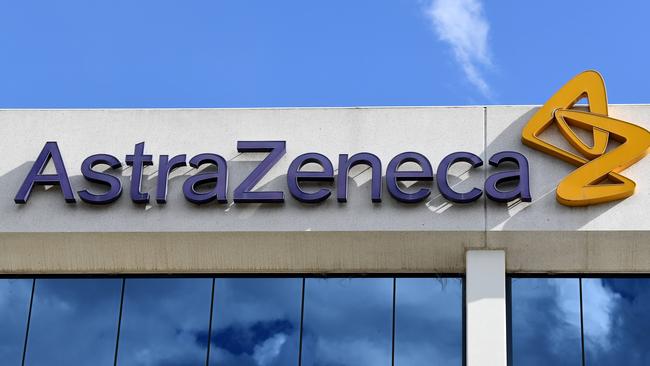
With Dow Jones
7.30am: Apple countersues over Fortnite
Apple has countersued Epic Games, accusing the “Fortnite” maker of breaching a contract when it introduced a new in-app payment system within the game, as the battle between the iPhone company and software developer continues to intensify.
Apple is asking a judge to award punitive damages and restrict Epic from continuing what it describes as unfair business practices. The filing came after Epic sought an injunction on Friday to force Apple to put the popular video game back in its App Store.
“Epic’s lawsuit is nothing more than a basic disagreement over money,” Apple said in its filing Tuesday. “Although Epic portrays itself as a modern corporate Robin Hood, in reality it is a multi-billion dollar enterprise that simply wants to pay nothing for the tremendous value it derives from the App Store.”
An Epic spokesman declined to comment beyond what the company has said previously about its efforts to fight what it sees as a monopoly payment system that suppresses competition and inflates prices.

The dispute began when Epic introduced the payment system on Aug. 13 within the “Fortnite” app that skirted the 30% fee that Apple and Alphabet Inc.’s Google charge for in-app purchases. Within hours, both companies removed the game from their app marketplaces for violating their rules. Epic later sued Apple and Google in California federal court, accusing both companies of anti-competitive conduct.
Epic is just the latest company to take issue with Apple’s control of the App Store, which is part of the giant’s evolution to expand beyond selling hardware and to generate revenue from software services. Apple’s App Store in the first seven months of this year generated nearly $US39 billion in global revenue from in-app purchases, subscriptions and premium apps, according to researcher Sensor Tower.
Dow Jones
7.10am: Rio cave blast probe may be suspended
A federal parliamentary inquiry into Rio Tinto’s blasting of ancient Aboriginal work shelters in Western Australia may be suspended, the ABC reports.
The inquiry had been due this month to visit the Pilbara site of the destruction.
However there are concerns about non-West Australian politicians going into indigenous communities, and pandemic restrictions prevent inquiry members meeting face-to-face with traditional owners.
Federal MP Warren Entsch told the ABC that because of the pandemic rules, the inquiry really has “no choice” but to be suspended.
Conducting the hearings via video or telephone link was not an option because of language and cultural barriers, he said.
However he said he would push for any mining companies already granted approval to destroy sacred sites to suspend such activities until the inquiry is completed.
6.35am: Tesla shares dive 21%
Tesla being passed over for inclusion in the S&P 500 index has put a halt to the parabolic run in the electric-car maker’s shares.
S&P Dow Jones Indices, which determines the makeup of the index, said Friday afternoon that online marketplace Etsy, technology firm Teradyne and pharmaceutical company Catalent would be added in its quarterly rebalancing. Tesla — whose shares have catapulted to new highs, partly in anticipation of joining the S&P 500 — was noticeably absent.
Tesla shares dropped 21 per cent overnight, their biggest one-day fall on record. The stock still has nearly quadrupled this year, despite declining 34 per cent in September. Tesla’s market value has ballooned to nearly $US308 billion, making it one of the biggest companies in the US by that metric.
The announcement is a particularly disappointing development for bullish investors who had aggressively positioned themselves for the company’s addition to the gauge. After the company reported its latest quarterly profits and plans to split its stock, many investors bet big that its shares would continue to soar.
They may have gotten ahead of themselves. Tesla appeared to be eligible for inclusion after its latest earnings report. To be considered for the index, companies must report an accumulated profit over four consecutive quarters, including the most recent.
Dow Jones
6.25am: ASX to sink at the open
Australian stocks are set for a solid opening fall after Wall Street ended sharply lower, led by declines among big tech.
At about 6am (AEST) the SPI futures index was down 99 points, or 1.7 per cent.
On Tuesday, Australian stocks closed 1.1 per cent higher, with gains across most sectors.
The Australian dollar was down at US72.17. Brent oil plunged 5.3 per cent to $US39.78 a barrel. Spot iron ore is down 0.7 per cent to $US129 a tonne.
6.15am: US stocks decline as tech slide extends
Big technology stocks pulled back for the third consecutive trading session, sparked by growing concerns that some of the stocks seen as beneficiaries of the coronavirus pandemic have climbed too far too quickly.
Among the biggest decliners were shares of Apple, Amazon.com, Facebook and Zoom Video Communications, all of which fell more than 4 per cent. Despite their recent losses, the stocks are still up sharply for the year, buoyed by the stay-home orders aimed at slowing the spread of the virus.
Their declines weighed on the tech-heavy Nasdaq Composite Index, which slumped more than 4 per cent, entering correction territory. The S&P 500 fell 2.8 per cent, and the Dow Jones Industrial Average lost 2.3 per cent.
“I think we should start to anticipate a rotation — the momentum behind tech is going to ease,” said Seema Shah, chief strategist at Principal Global Investors. “As we’re seeing easing lockdowns and the prospect of a vaccine, people are beginning to go back to a more normal way of life and reliance on tech is starting to fade from the peak where it was at the height of the lockdown.”
Still, few investors say they believe the recent rout signals the end of a rally. The Nasdaq and the S&P 500 closed at records as recently as last Wednesday.
Energy stocks took a beating as oil prices extended their drop on concerns demand is slumping amid a still uneven economic recovery. Saudi Arabia signalled an expectation for reduced demand over the weekend by cutting prices.
Brent crude, the global oil benchmark, fell 5.3 per cent to $US39.78 a barrel, dropping below $US40 for the first time since June. US crude fell 7.6 per cent.
Tesla shares, meanwhile, fell 21 per cent after S&P Dow Jones Indices late Friday passed over the electric car maker for inclusion in the S&P 500, which many investors had bet would give the shares another lift.
Also weighing on markets was an uptick in economic tensions between the US and China.
President Trump said in a Monday press conference that he was considering “decoupling” from China and wasn’t seeking to bring outsourced jobs back to the US The comments are the latest twist in a multi-year spat between the two largest economies in the world that have centred around technology, security and jobs.
In Europe, the pan-continental Stoxx Europe 600 dropped 1.1 per cent as another round of Brexit trade negotiations between the UK and the European Union are set to begin on Tuesday.
Dow Jones Newswires
5.55am: JPMorgan Chase fraud probe
US financial behemoth JPMorgan Chase said it was working with authorities after learning of unethical conduct by customers and employees connected to huge government pandemic relief programs.
A JPMorgan memo rued “conduct that does not live up to our business and ethical principles — and may even be illegal,” bank executives said in a message to employees.
“If you see conduct that doesn’t live up to our high standards and strong values, say something,” they said in the memo, adding that confidential complaints were welcome.
They pointed to problems with customers misusing funds under from the Paycheck Protection Program, unemployment benefits and other government programs, and said “Some employees have fallen short, too.” “We are doing all we can to identify those instances, and co-operate with law enforcement where appropriate.”
AFP
5.50am: Oil prices tumble
Oil prices slumped to their lowest level in nearly three months, under pressure from a stalling recovery in demand and planned production expansions by OPEC that threaten to add to an existing glut of crude.
US crude-oil futures slid 7.6 per cent to $US36.76 a barrel, hitting their lowest level since mid-June. Brent crude, the global gauge of oil prices, dropped 5.3 per cent to $US39.78 a barrel, the first time the international benchmark has fallen below $US40 in nearly three months. US crude was partly catching up with Monday’s drop in Brent, when U.S. markets were closed for Labour Day.
Record oil imports by China, the return of cars to US roads and steep production cuts fuelled a rebound after crude prices crashed this spring. But Chinese purchases have slowed since mid-July, the comeback in American gasoline demand has stalled and the Organisation of the Petroleum Exporting Countries is boosting output. All these factors have combined to pull prices back down.
“Right now the market is coming back to reality,” said Eugen Weinberg, head of commodity research at Commerzbank. “The problem is that gasoline demand in the U.S. didn’t continue to increase.”
Shares of major energy producers were stung by the drop in crude prices, with the S&P 500 energy sector extending its year-to-date slide to about 45 per cent.
Tuesday’s lurch lower ended a stretch of calm in the oil market, which didn’t move much in either direction over the summer. Some traders had been bracing for a decline in prices, which they said had been trapped in a narrow range partly by bets against volatility in the options market.
Dow Jones
5.47am: Walsh leaves IAG amid pay protest
Willie Walsh bowed out as chief executive of airline giant IAG amid a protest over executive pay and as the industry struggles with disruption from the coronavirus pandemic.
IAG, which owns British Airways, Iberia and Aer Lingus, revealed that only 71.6 per cent of investors approved the executive remuneration report at the company’s annual shareholder meeting.
Walsh’s package comprises a bonus of £883,000 (975,000 euros, $1.15 million) and totalled £3.2 million for 2019.
The package — up five per cent on 2018 — was decided before the coronavirus crisis, which has devastated the airline industry by grounding planes worldwide.
IAG posted a first-half net loss of 3.8 billion euros ($4.5 billion), while British Airways had already warned it could slash up to 12,000 jobs.
Pilots’ union BALPA recently criticised “Fat Cat” bonuses, saying they were a “an insult to staff losing jobs and taking pay cuts”. It particularly criticised the proposed 458,000-euro bonus for Ryanair boss Michael O’Leary, whose company is shedding 3,000 jobs.
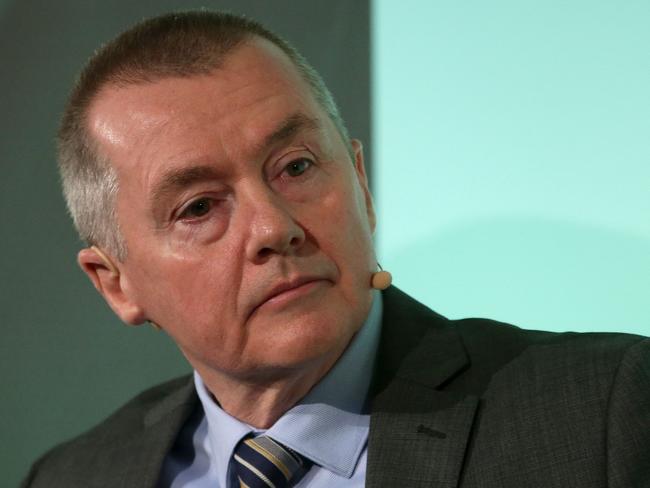
Walsh was due to leave IAG in March but agreed to stay on as COVID-19 swept across the world.
He has spent 15 years with the group, during which time he oversaw the 2011 merger of British Airways with Iberia to form IAG, which then expanded.
He will be replaced by Iberia CEO Luis Gallego, who is to earn a salary of £820,000 plus bonuses.
AFP
5.45am: New problem with Boeing Dreamliner
Boeing said it has found a new production issue that will impact deliveries of its 787 Dreamliner, in the latest blow to the aviation giant.
“We are taking time to thoroughly inspect completed 787s to ensure that they are free of the issues and meet all engineering specifications prior to delivery,” a company spokesman said.
“We expect these inspections to affect the timing of 787 deliveries in the near-term.” The new issue came on the heels of Monday’s announcement that the company had identified two issues with the manufacture of the join in a portion of the fuselage in some 787s that, “in combination, result in a condition that does not meet our design standards.” In the statement Tuesday the company said there also was an issue with the horizontal stabiliser.
Boeing said Monday it contacted airlines that operate eight 787s that needed to be removed and repaired before they can return to service.
According to an internal Federal Aviation Administration (FAA) memo seen by the Wall Street Journal, the regulator could be looking at quality control errors that may have potentially lasted for 10 years. The investigation could lead to enhanced inspections of hundreds of planes, the Journal reported Monday.
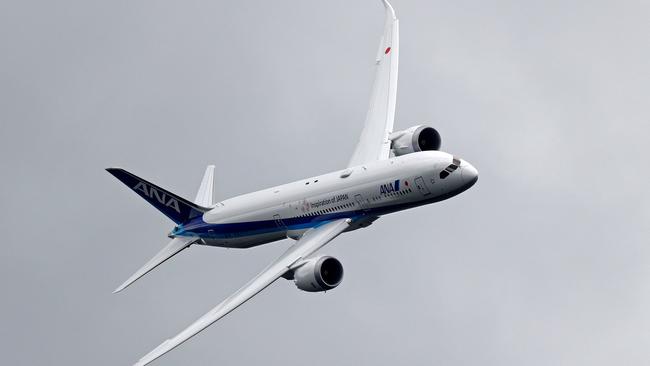
AFP
5.40am: Pound pummelled on Brexit tack
Oil prices and the pound slumped as markets mulled global demand prospects and heightened Brexit tension.
The price of benchmark US oil was seven per cent lower while Brent crude, the European standard, shed 4.7 per cent.
Sterling slumped close to a one-month low against the dollar as investors fretted over heightened Brexit tensions ahead of crunch trade talks between London and Brussels.
Oil prices have begun a steady decline as the coronavirus pandemic weighs on the outlook for demand.
“It is getting very ugly in the energy space as the revised base case scenarios for a return to a pre-pandemic crude demand levels keeps getting pushed back,” remarked Oanda analyst Edward Moya.
The pound dropped more than 1.0 per cent versus the greenback to $US1.3022 — a level last seen on August 12 — before edging back slightly.
The pound began its fall Monday after Prime Minister Boris Johnson revived the prospect of a no-deal Brexit, saying that if an EU trade deal was not struck by October 15 then there would not be one.
Sterling fell following confirmation that the head of the UK government’s legal department has resigned over Johnson’s last-minute changes to Britain’s EU Withdrawal Agreement.
Northern Ireland Secretary Brandon Lewis admitted that the changes break international law in “tightly defined circumstances”.
London closed down 0.1 per cent, Frankfurt shed 1.0 per cent and Paris lost 1.6 per cent.
Asian stocks had ticked higher following steep drops last week, as investors brushed off US President Donald Trump’s latest anti-China salvo.
AFP
5.35am: AFP action against Google over copyright
Agence France-Presse announced that it had lodged a complaint with French regulators over a standoff with Google, saying the US giant is refusing to move forward on paying to display the agency’s content in web searches.
Last April, France’s competition authority ordered Google to negotiate “in good faith” with media groups, after it refused to comply with a new EU law governing digital copyrights.
The so-called “neighbouring rights” aim to ensure that news publishers are compensated when their work is shown on websites, search engines and social media platforms.
Although talks were carried out over several months, news publishers said Google was refusing to budge, prompting complaints by the newspapers’ alliance APIG as well as French magazine publishers.
“We have also filed a complaint with the competition authority because we consider that Google has not negotiated in good faith,” AFP’s chief executive Fabrice Fries said.
“Google offered to extend the talks, but we refused because they were going nowhere — we determined they would not advance unless there was a change in method,” he said.
Isabelle de Silva, president of the competition authority, said one option could be to name a mediator for the talks, as suggested by some participants in recent weeks.
For now, however, the regulator is waiting for a ruling from a Paris appeals court after Google challenged the validity of the negotiations imposed last April.
De Silva said a court hearing was set for Thursday, and a ruling could come as soon as this month.
AFP
5.30am: Beyond Meat in China push
Beyond Meat is looking to take a bite out of the massive Chinese market, announcing plans to produce its plant-based beef, pork and chicken in the Asian nation.
The US substitute meat start-up said it plans to open two facilities near Shanghai, after reaching an agreement with the Jiaxing Economic & Technological Development Zone.
The wholly-owned subsidiary of the California company plans to start production in early 2021.
“China is one of the world’s largest markets for animal-based meat products, and potentially for plant-based meat,” said Beyond Meat CEO and founder Ethan Brown in a statement.
The facilities will include “one of the world’s largest and technologically advanced plant-based meat factories,” in a “vitally important country and market,” Brown said.
Beyond Meat products are marketed in more than 80 countries, but the China outpost would mark a major expansion.
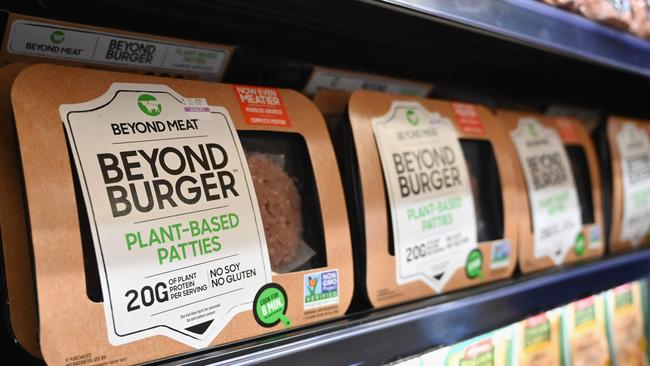
AFP
5.28am: GM takes stake in electric trucks
General Motors and Nikola announced a strategic partnership under which GM will receive an 11 per cent stake in the electric truck company in exchange for providing technology and manufacturing.
The American auto giant will provide “in-kind” services to the electric truck start-up and will “engineer, homologate, validate and manufacturer the Nikola Badger battery electric and fuel cell versions,” the companies said in a joint press release.
The Nikola Badger is an electric pick-up truck.
AFP
5.25am: UK may have paid billions in error
The British government may have paid out billions of pounds in erroneous or fraudulent applications for its ongoing wages support scheme, aimed at safeguarding jobs in the coronavirus pandemic, a top official has revealed.
The top civil servant at Britain’s tax department, Jim Harra, told a parliamentary committee that between five and 10 per cent of cash used for the government’s furlough scheme — equivalent to £3.5 billion ($4.5 billion, 3.7 billion euros) — might have ended up in the wrong hands.
The government has paid out £35.4 billion to finance the bulk of wages for around 10 million workers placed on furlough under a scheme set to end next month.
The amount wrongly paid out “will range from deliberate fraud through to error”, Harra told the panel.
AFP
5.23am: Google abandons Dublin office plan
Google says it is dropping talks to rent office space for up to 2000 staff in Dublin, after most of the US tech giant’s employees were told to work from home until 2021 amid the global pandemic.
A spokeswoman said that “after much deliberation” Google “has decided not to proceed with leasing” the Sorting Office — a seven-floor development in the “Silicon Docks” of the Irish capital.
Irish media reported the 202,000-square-foot (18,700-square-metre) office would have housed up to 2000 employees in the Republic — where the internet search leader maintains its European headquarters and a stable of 8000 staff.
The Google spokeswoman declined to comment on whether the decision to discontinue the lease talks was related to coronavirus work-from-home measures.
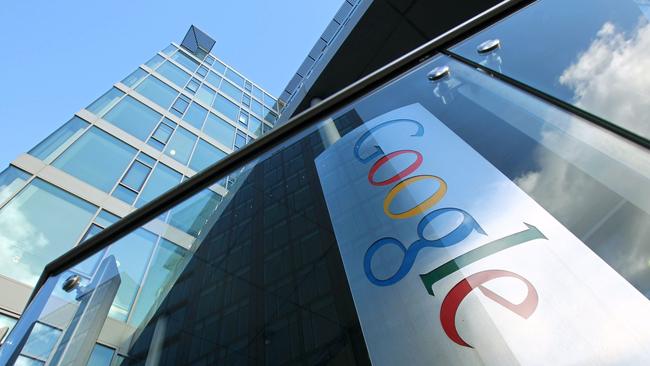
AFP
5.20am: South African economy shrinks by half
South Africa’s economy shrank by more than half in the second quarter as business activity in the country ground to a halt as a result of the coronavirus pandemic, the national statistics agency said.
“South Africa’s economy contracted by 51 per cent in Q2 2020” compared with the same period of 2019, Statistics South Africa said in a statement.
The unprecedented contraction came after a strict lockdown, imposed on March 27, caused most economic activity to cease.
It was driven largely by steep declines in the construction, manufacturing and mining sectors, where activity shrank by up to 70 per cent.
South Africa’s economy was already in recession — its second in two years — when it was hit by the virus and had shrunk by two per cent during the first three months of this year.
AFP




To join the conversation, please log in. Don't have an account? Register
Join the conversation, you are commenting as Logout